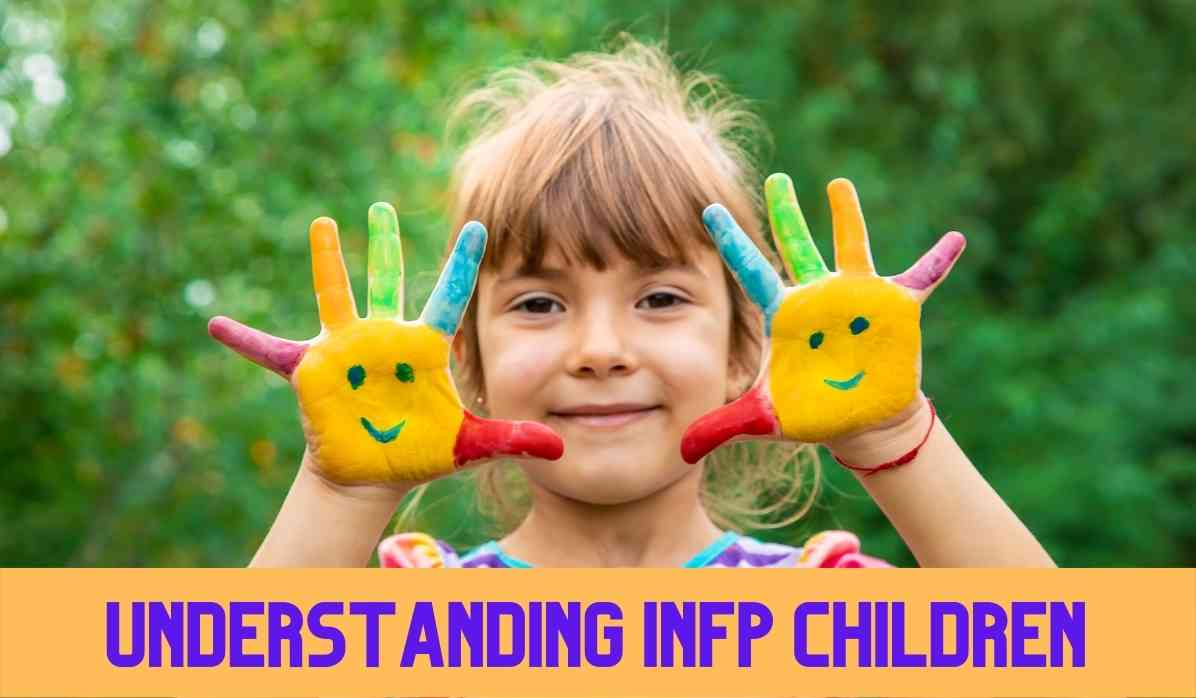INFP Children: Traits, Struggles, and Parenting Tips

INFP children are creative, emotionally rich individuals with a deep, philosophical nature.
Their strong values make them unique and lovable.
As sensitive souls, they aspire to heal the world and have a special place in their hearts for underdogs.
From a young age, they’re quiet dreamers, but their wandering minds can make focusing a challenge.
They’re passionate learners, though traditional school settings may be tough for them. With boundless imagination and a love for new experiences, INFP children crave exploration and resist constraints.
Navigating authority and rules can be difficult, but they strive to find balance in their lives, cherishing the freedom to explore the world and their own minds.
Recognizing the INFP Child

Traits of an INFP child
Introverted Nature of INFP Children
INFP children are often introverted, meaning they gain energy from spending time alone or in smaller, more intimate settings.
While they might not be the most outgoing kids on the playground, their introverted nature allows them to develop a rich inner world.
They enjoy reflecting on their thoughts and experiences and can spend hours lost in their own imaginations.
It’s essential to understand that their need for solitude doesn’t mean they are anti-social or uninterested in others; they simply recharge best in quieter environments.
Sensitivity and Empathy in INFP Children
One of the defining traits of INFP children is their heightened sensitivity and empathetic nature.
They have a natural ability to understand and connect with others’ emotions, making them great listeners and confidants.
However, this sensitivity can also make them susceptible to feeling overwhelmed by strong emotions, both their own and those of others.
RELATED: 25 Unique INFP Talents You’re Not Aware Of
It’s important to help your INFP child learn healthy coping mechanisms for dealing with their emotional sensitivity and to reassure them that it’s okay to feel things deeply.
The Creative Spark in INFP Children
INFP children are often highly creative and drawn to activities that allow them to express themselves and explore their imaginative worlds.
Whether it’s through writing, drawing, painting, or crafting, they thrive when given opportunities to channel their creativity.
Encourage your INFP child’s artistic pursuits by providing a variety of materials, tools, and experiences to help them discover and develop their unique talents.
RELATED: Why Are INFPs So Cute? A Deep Dive Into Their Adorable Nature
Remember to celebrate their accomplishments and offer constructive feedback that supports their growth and self-esteem.
The Imaginative World of INFP Children
The imaginative minds of INFP children can be both a blessing and a challenge.
Their ability to dream up fantastical scenarios and stories is a testament to their creative and curious nature.
However, they may sometimes struggle to differentiate between their vivid imaginings and reality, leading to daydreaming and a lack of focus in more structured settings.
To help them stay grounded, encourage them to share their imaginative thoughts and provide a healthy balance of structured activities and free time for exploration.
This way, they can learn to appreciate the value of their creativity while also developing the necessary focus and discipline for everyday life.
Interests and hobbies
The Joy of Reading for INFP Children
INFP children often find solace and inspiration in the world of books. Their natural love for stories and rich inner lives make reading a perfect hobby for them.
Through books, they can explore new worlds, meet interesting characters, and learn valuable life lessons.
Encourage your INFP child’s love for reading by providing them with diverse books that cater to their interests and spark their imagination.
RELATED: Most Independent MBTI Personalities Ranked
Also, consider setting aside dedicated reading time or creating a cozy reading nook where they can curl up and lose themselves in a good book.
Writing as a Creative Outlet for INFP Children
With their vivid imaginations and strong emotional connections, INFP children often find writing to be a fulfilling and engaging hobby.
Writing allows them to express their feelings, ideas, and dreams, which can be therapeutic and empowering.
Support your child’s passion for writing by providing them with journals, notebooks, and writing prompts to inspire their creativity.
Celebrate their work and encourage them to share their stories with others, whether it’s through informal storytelling sessions or joining a writing club.
Drawing and Artistic Expression for INFP Children
The creative nature of INFP children extends to the visual arts, where they can find satisfaction in expressing themselves through drawing, painting, or other artistic mediums.
These activities provide a wonderful outlet for their emotions and ideas while helping them develop their fine motor skills and artistic talents.
To support your child’s interest in art, consider enrolling them in local art classes or workshops, providing them with a variety of materials and tools to experiment with, and displaying their artwork around your home to boost their confidence.
The Power of Daydreaming for INFP Children
Daydreaming might not seem like a productive hobby, but for INFP children, it’s an essential part of their imaginative and creative development.
Their vivid daydreams can serve as fertile ground for future stories, art projects, or even problem-solving.
Instead of discouraging daydreaming, help your child find a balance between their imaginative world and the real world.
Set aside time for daydreaming, but also encourage them to engage in other hobbies and activities that help them develop focus and discipline.
RELATED: Most Mysterious MBTI Personalities Ranked
By striking this balance, your INFP child will be able to enjoy the benefits of their rich inner world while still thriving in their everyday lives.
Social life
Small Group Connections for INFP Children
When it comes to socializing, INFP children typically prefer small, intimate gatherings over large, noisy events.
They feel more comfortable and at ease when they can engage in meaningful conversations and build deep connections with a few close friends.
As a parent, it’s important to respect your child’s preference for smaller social settings and provide opportunities for them to connect with like-minded peers.
Playdates, clubs, or classes focused on their interests can be great ways for your INFP child to make friends and develop lasting relationships.
The Importance of Deep Connections for INFP Children
INFP children are naturally drawn to forming deep, authentic connections with others.
They appreciate relationships built on trust, understanding, and shared values.
As a result, they may be selective in choosing friends and take their time to open up to new people.
Encourage your INFP child to cultivate friendships that make them feel comfortable and understood.
It’s also important to teach them that it’s okay to have a smaller circle of friends as long as those friendships are meaningful and supportive.
INFP Children as Good Listeners
One of the strengths of INFP children is their ability to truly listen to others.
Their empathetic nature allows them to connect with people on a deeper level, making them excellent listeners and confidants.
Encourage your child to embrace this gift by teaching them active listening skills and emphasizing the importance of empathy and understanding in relationships.
By doing so, you can help your INFP child develop strong bonds with others and become a valued friend to those around them.
Balancing Social Needs and Introversion
While INFP children enjoy meaningful connections with others, they also need time alone to recharge their emotional batteries.
It’s essential for parents to recognize and respect their child’s need for solitude and to balance social activities with opportunities for quiet reflection.
Encourage your INFP child to communicate their feelings and needs openly, so you can help them find the right balance between socializing and alone time.
By understanding and supporting their unique social needs, you’ll help your INFP child thrive in their relationships and maintain a healthy sense of self.
Childhood Struggles for INFP Children

Emotional sensitivity
Emotional sensitivity is a double-edged sword for INFP children. On one hand, it allows them to empathize deeply with others, making them excellent friends and confidants.
They might struggle to process these feelings, which can lead to anxiety, stress, or even emotional outbursts.
Criticism is another area where INFP children’s sensitivity can be a challenge.
RELATED: Why Are INFPs So Sad? Dissecting The Depressed INFP
They often take criticism to heart and may feel personally attacked, even when the feedback is meant to be constructive.
As a parent, it’s important to approach criticism with care and gentleness, emphasizing your love and support for your child while offering guidance for improvement.
By understanding and respecting their emotional sensitivity, you can help your INFP child develop resilience and learn to navigate their emotions in a healthy, constructive manner.
Conforming to social norms
INFP children can find it challenging to conform to social norms and adapt to structured environments due to their creative and individualistic nature.
They tend to march to the beat of their own drum, which may make them feel like outsiders in settings where conformity is expected.
INFP children might struggle with strict routines and rigid expectations as they thrive in spaces where their unique perspectives and talents are celebrated.
As a parent, it’s crucial to support your child’s individuality while also teaching them the importance of finding balance and navigating societal expectations with grace and confidence.
Communication challenges
INFP children, with their sensitive and empathetic nature, can sometimes face communication challenges when expressing their emotions.
They may hold back their true feelings for fear of being misunderstood or causing conflict. Additionally, they might find it difficult to put their complex emotions into words.
As a parent, it’s essential to create a safe and supportive environment where your child feels comfortable sharing their feelings openly.
RELATED: Most Spontaneous MBTI Personalities: Are You One of Them?
Encourage them to express themselves through various means, such as writing, drawing, or simply talking one-on-one, and reassure them that their emotions are valid and understood.
Parenting the INFP Child
Emotional support
Emotional support and understanding are crucial for INFP children as they navigate their complex emotions and develop emotional resilience.
By offering a safe space for them to express their feelings and validate their experiences, you help them feel seen and understood.
This, in turn, promotes their self-esteem and emotional well-being.
Encourage open conversations about emotions and provide guidance in managing difficult feelings.
By nurturing your INFP child’s emotional needs, you’re fostering their growth into emotionally resilient, empathetic, and self-aware individuals who can face life’s challenges with confidence and grace.
Fostering creativity
Fostering creativity is essential for INFP children, as it allows them to express themselves and explore their passions.
To nurture their creative talents, provide them with opportunities to engage in various artistic activities, such as painting, writing, or playing musical instruments.
Encourage them to experiment with different creative outlets and support their interests, even if they change over time.
Create a nurturing environment that celebrates their artistic expression and unique perspectives.
By prioritizing and embracing your INFP child’s creativity, you’re helping them develop their talents, confidence, and sense of identity.
Encouraging independence
Encouraging independence is vital for INFP children as they develop their sense of self and autonomy.
Support their decision-making by offering guidance without imposing your own preferences, and respect their choices even when they differ from your expectations.
Give your child space to grow and explore their interests, allowing them to learn from their experiences and develop problem-solving skills.
RELATED: Most Empathetic MBTI Types: 16 Personalities Ranked
By striking a balance between providing support and promoting independence, you’re helping your INFP child build confidence in their abilities and become self-reliant individuals who can navigate life’s challenges with resilience and assurance.
Final Thoughts
In conclusion, understanding and supporting the unique needs of your INFP child is essential for their growth and happiness.
By embracing their sensitivity, fostering their creativity, and encouraging their independence, you’re helping them develop into emotionally resilient, confident, and self-aware individuals.
With patience, love, and guidance, you can nurture your INFP child’s strengths and empower them to thrive in their own authentic way.
What’s Next?
- How Do ENTJs Deal With Depression? (And How To Help Them)
- How Does An INFJ Show Interest? Signs of Attraction
- How Do You Get An INTP To Like You? Tips to Win Them Over!
- Why Are INFPs So Cute? Learn Their Secrets!
- The Pros and Cons of Being an INTP Lawyer
Featuring 10 powerful exercises, offering a glimpse into the transformative practice of shadow work.
